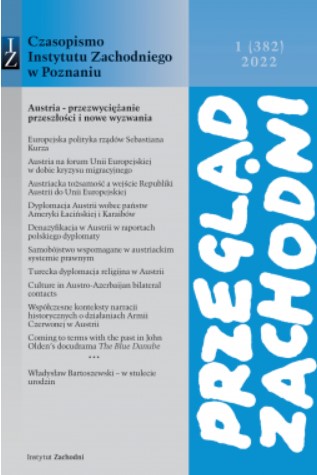Analiza polityki europejskiej rządów Sebastiana Kurza
An analysis of the European policy of Sebastian Kurz's rule
Author(s): Justyna MiecznikowskaSubject(s): Government/Political systems, Political behavior, EU-Approach / EU-Accession / EU-Development
Published by: Instytut Zachodni im. Zygmunta Wojciechowskiego
Keywords: Austria; European Union; European policy; presidency of the EU Council; New People’s Party; The Freedom Party of Austria; The Greens – The Green Alternative;
Summary/Abstract: The article aims to analyze the European policy of chancellor Sebastian Kurz’s first government formed by ÖVP and FPÖ between 2017-2019 and his second cabinet, which was composed of ÖVP and Grüne and formed in 2020. The hypothesis adopted is that, regardless of the instability of the cabinet and the discredit of the leading politicians, the main assumptions of Austria’s EU policy remain unchanged. Such stability results from the domination of the pro-European Austrian People’s Party in the coalition government and is a consequence of the determinants influencing Austria’s strategic goals in united Europe. First, the article presents the geopolitical, economic, and social factors in the European policy which determine Austria’s main interests in the EU. Next, it compares the coalition agreement between Christian Democrats and the Freedom Party with the 2020-2024 government program of Christian Democrats and the Greens in terms of Austria’s role in the EU as promoted by the coalition parties. It also contains a qualitative analysis of the election manifestos published by different coalition members and an evaluation of their priorities in Austria’s European policy and attitudes towards the EU deepening and territorial expansion. Lastly, it summarizes Austria’s implementation of its EU policy, including its 2018 EU Council presidency.
Journal: Przegląd Zachodni
- Issue Year: 382/2022
- Issue No: 01
- Page Range: 7-29
- Page Count: 23
- Language: Polish

